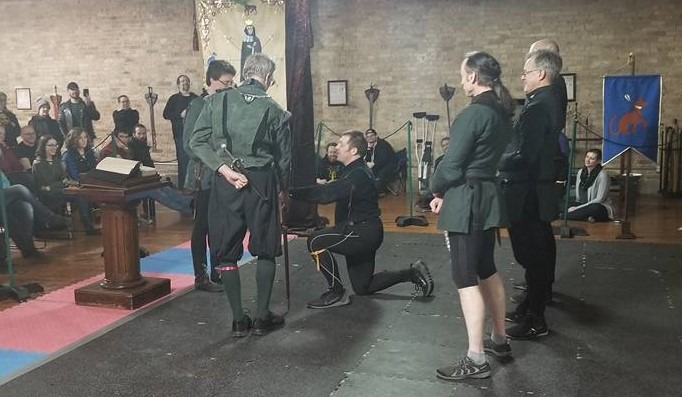This past weekend, I was on an examination board for the first Provost of Armizare at the Chicago Swordplay Guild (CSG), Jesse Kulla. Provost is the rank before Master in most schools that follow an Italian martial arts tradition. I sat on a board with Sean Hayes, Maestro of Northwest Fencing Academy, Marco Quarta, Maestro of Nova Scrimia, Christian Cameron, Chief Instructor of Hoplologia, and of course, our host, Gregory Mele, Maestro of the Chicago Swordplay Guild.
As always, this was an intense experience for the candidate and the examiners. A full day of private examination on fencing theory, pedagogy, and teaching methodology, followed by a day of practical examination and the playing of a prize (a public combat examination).
The Labours of Examination
An examination is an ordeal, in the classical sense. After the first day was complete, on our way to dinner, the first thing Jesse said to me was "that was rough." Tests are part of the rights of initiation. They mark transitions and milestones on our path of growth with a certain amount of pain. At their best, they act as a crucible that brings together all the learning and hard work that preceded them and forges them into something new; something more complete.
Yet pain is not the purpose or the necessity. It's just a side effect of the emotional weight and exertion that being pushed to your edge can bring. In fact, as an examiner, I put great effort into balancing the demands I make of a candidate with creating an environment that will help them perform their best in the moment.
Martial Environment, Real World Learning
It takes practice to meet challenges, recover from failures, and take stock in growth. I think one of the most valuable things that martial arts, and the rituals that surround them, can offer us is the opportunity to have this practice. It's an ordeal that is perhaps not the central part of our life but brings us through all of the stages we will face in any challenge. These opportunities, whether successful or not, teach us about ourselves, build resilience, and character and help us face real challenges in the broader world. They also reflect the duality of how these roads are both travelled alone and with the presence and support of our community.
I went up and down on the emotional roller coaster as much as Jesse did through this ordeal. It was important for me to both support Jesse and act with the integrity needed to honour the requirements of this rank—to support the outcome I thought would be best for Jesse's growth and his school. I was fortunate to have a team, the board, to be a part of and that I did not need to come to any conclusions alone. I also knew that Jesse's community had helped him prepare for this event and would help him process and grow regardless of the outcome.
Conclusion
Jesse performed very well, particularly during his prize. Beyond questioning him on theory and witnessing and critiquing his teaching examinations, I also had the pleasure of facing him at spear, arming sword, and longsword in the martial challenges.
He is an exemplary fighter, a true leader in his community, an exemplar of knightly virtue, and someone that I feel has a lot to offer our community as a whole.
I was proud to stand behind him, with this august board, and witness him receive his garter, pendant, and scroll as part of the CSG's ceremony for provost.
